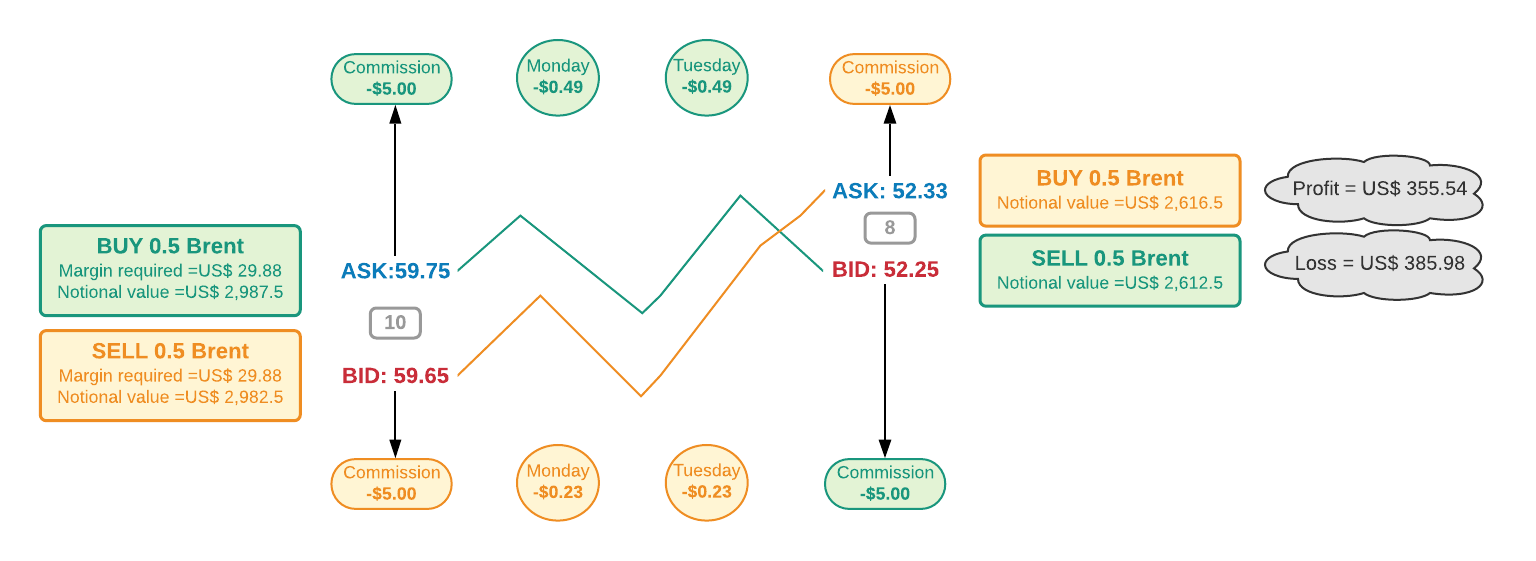Contracts for Difference (CFD) Trading Guide
A contract for difference, otherwise known as a CFD, is a convenient way to speculate on a wide range of financial markets. However, there are a lot of risks. Our guide explains the basics of CFDs and important aspects you need to know about.
Updated 24 April 2024
Warning: Due to the speculative and highly leveraged nature of CFDs, trading this instrument is incredibly risky. This guide is not a not a suggestion or recommendation to trade CFDs, nor is its publication an endorsement of CFDs in general. We have made this guide available to help build understanding around CFDs and the significant risks involved.
Our view is simple - the lack of a robust risk management strategy and position sizing technique ultimately leads to total wipe-out, especially when trading volatile markets.
Our guide covers:
Do you want to compare CFD Trading Platforms? Our CMC Markets vs Plus500 vs IG Market vs BlackBull Markets Comparison has everything you need to know.
Advertising Disclosure: We may earn a referral bonus for anyone that clicks on some of the below links - see our Advertising Policy for more details.
Warning: Due to the speculative and highly leveraged nature of CFDs, trading this instrument is incredibly risky. This guide is not a not a suggestion or recommendation to trade CFDs, nor is its publication an endorsement of CFDs in general. We have made this guide available to help build understanding around CFDs and the significant risks involved.
Our view is simple - the lack of a robust risk management strategy and position sizing technique ultimately leads to total wipe-out, especially when trading volatile markets.
Our guide covers:
- What is a Contract for Difference (CFD)?
- How are CFDs Regulated in New Zealand?
- The Risks of Trading CFDs
- Popular CFD Brokers Operating in New Zealand
- CFD Trading in New Zealand - Frequently Asked Questions
Do you want to compare CFD Trading Platforms? Our CMC Markets vs Plus500 vs IG Market vs BlackBull Markets Comparison has everything you need to know.
Advertising Disclosure: We may earn a referral bonus for anyone that clicks on some of the below links - see our Advertising Policy for more details.
An Introduction to CFD Trading in New Zealand
Contracts for difference, also known as CFDs, are a financial derivative usually offered with high leverage for placing short term trades on various financial markets. Specifically:
- CFDs are always settled in cash and do not give the options to buy the underlying asset.
- The main attractions to CFD trading are high leverage, low transaction costs, the ability to go long and short, no expiry date and convenient settlement terms.
- CFD trading has become a topic of controversy in recent years. Regulations governing the sale of CFDs to retail investors have been overhauled in Europe, Australia and other regions. New Zealand was regulated in 2017.
- CFD providers operating in New Zealand require a license from the New Zealand Financial Markets Authority (FMA).
- Leveraged foreign exchange trading is often provided alongside CFD products.
|
Looking to develop a CFD strategy? BlackBull Markets is a trusted NZ-based broker offering comprehensive CFD trading services with the following advantages:
|
What is a Contract for Difference (CFD)?
A CFD is an agreement between a broker (seller) and a trader (buyer). The agreement concerns a financial asset, which could be a foreign exchange currency pair, an index, a stock or share, a commodity or even another derivative, such as a futures market.
Know This:
The characteristics of a CFD are as follows:
The diagram below illustrates how a CFD transaction functions:
Know This:
- When trading CFDs, you’re speculating on the price of an asset.
- Rather than buying or investing in an asset, you’re opening a position.
- When the contract is opened, the entry price is defined. At some point, the position will be closed, and the difference between the entry price and closing price, minus any commissions or fees, is what should be settled between the buyer and seller.
- The CFD will always be settled in cash. As such, the settlement terms are easier to understand than other financial derivatives such as futures and options.
- Profits (and Losses): Should the buyer be profitable, the seller will pay the difference between the opening and closing prices. Should the buyer not be profitable, they pay the difference to the seller, hence the name, contract for difference.
The characteristics of a CFD are as follows:
- The instrument: the asset you’re trading
- Leverage: how much margin is required to open and maintain the position
- Trade direction: long or short (buy or sell)
- Trade size: the size of the contract
- Entry and exit price: price when initiating the contract and concluding the contract
- Fees: spreads, commissions, swaps and others may apply
The diagram below illustrates how a CFD transaction functions:
The example shows a long trade and a short trade for 0.5 lots of Brent crude oil vs US dollar, the equivalent of 50 barrels. The following properties have been used:
From this diagram, you should notice the following:
The profit and loss of the two CFDs were calculated in the following way:
Important: The losing trade loses more than profitable trade earns due to spreads and fees. The fees reduce profits and increase losses.
- Leverage: 1:100
- Contract Size = 100 Barrels
- Commission = $10 per Lot
- SWAP Long = -0.97
- Swap Short = -0.46
From this diagram, you should notice the following:
- The long (buy) position was opened on the ASK price and closed on the BID price and vice versa for the short (sell) position. If you open a position and immediately close it without the prices changing, you would be at a loss; hence why the spread is considered a cost.
- With leverage of 1:100, only 1% of the contract’s notional value is required to hold the position.
- The position was held for two days. Therefore, swaps were charged on both positions. It’s typical for different rates to be applied to long and short positions.
- A CFD position consists of two trades, opening trade and a closing trade, hence why a commission is charged twice.
The profit and loss of the two CFDs were calculated in the following way:
- Long CFD: (2,987.5 - 2,612.5) + 5 + 5 + 0.49 + 0.49 = US$ 385.98
- Short CFD: (2,982.5 - 2,616.5) - 5 - 5 - 0.23 - 0.23 = US$ 355.54
Important: The losing trade loses more than profitable trade earns due to spreads and fees. The fees reduce profits and increase losses.
How are CFDs Regulated in New Zealand?
The Financial Markets Authority is responsible for overseeing, proposing legislation and ultimately enforcing laws related to financial services and capital markets in New Zealand. According to the FMA, since December 2017, “companies offering short-duration derivative products to New Zealanders that settle within 3 days, whether they are based here or abroad will require a licence.”
Brokers offering CFDs to New Zealanders must have a Derivatives Issuer Licence from the New Zealand FMA. Forex trading offered similarly to CFDs, where traders can speculate on the exchange rate difference of two currencies using leverage where no physical delivery occurs may only be provided by companies with a Derivatives Issuer license from the FMA.
Currently, there are 23 licensed Derivative Dealers listed on the FMA registry. You can find a list of licensed entities on the FMA website. The FMA also maintains a list of suspended licenses and distributes notices of organisations they believe threatens the safety of consumers and retail traders of New Zealander or are falsely claiming to be authorised by the FMA.
Forex and CFD brokers incorporated in New Zealand must also enlist on the Financial Services Provider Register (FSPR), which is a prerequisite to applying for a Derivatives Issuer license from the FMA.
New Zealand FSPR
Our View: Due to the low level of requirements to join the FSPR, there are numerous cases of brokers misrepresenting what it means by implying it’s a license and deceiving overseas clients who are unfamiliar with New Zealand financial legislations. To make matters more confusing, companies may register as foreign exchange providers, but this activity concerns converting currency, rather than offering leveraged CFD-style forex trading.
Therefore, traders looking to cooperate with a New Zealand broker must ensure the firm is regulated and authorised by the New Zealand Financial Markets Authority. If you’re an international trader looking for an offshore broker, keep in mind that FSP registration does not imply any regulatory oversight.
Brokers offering CFDs to New Zealanders must have a Derivatives Issuer Licence from the New Zealand FMA. Forex trading offered similarly to CFDs, where traders can speculate on the exchange rate difference of two currencies using leverage where no physical delivery occurs may only be provided by companies with a Derivatives Issuer license from the FMA.
Currently, there are 23 licensed Derivative Dealers listed on the FMA registry. You can find a list of licensed entities on the FMA website. The FMA also maintains a list of suspended licenses and distributes notices of organisations they believe threatens the safety of consumers and retail traders of New Zealander or are falsely claiming to be authorised by the FMA.
Forex and CFD brokers incorporated in New Zealand must also enlist on the Financial Services Provider Register (FSPR), which is a prerequisite to applying for a Derivatives Issuer license from the FMA.
New Zealand FSPR
- Before the FMA was introduced in 2011 and given broad powers in 2014 with the introduction of well-defined legislation in the Markets Conduct Act 2013 (FMC Act), New Zealand only maintained a registry of financial service providers.
- Before 2013, the requirements to become registered on the FSPR were pretty slim, and in some respects they still are. Previously, overseas companies with a virtual office could register themselves to the New Zealand FSPR. Currently, only New Zealand incorporated companies may register. Unless the FMA authorises them to carry out the respective activity, they may not offer services to retail clients in New Zealand.
- The FSPR only mandates that a company be incorporated in New Zealand, follow local business laws, file annual reports to the registrar, and ensure the shareholders and directors maintain clean criminal records, remain solvent and disclose any political associations.
Our View: Due to the low level of requirements to join the FSPR, there are numerous cases of brokers misrepresenting what it means by implying it’s a license and deceiving overseas clients who are unfamiliar with New Zealand financial legislations. To make matters more confusing, companies may register as foreign exchange providers, but this activity concerns converting currency, rather than offering leveraged CFD-style forex trading.
Therefore, traders looking to cooperate with a New Zealand broker must ensure the firm is regulated and authorised by the New Zealand Financial Markets Authority. If you’re an international trader looking for an offshore broker, keep in mind that FSP registration does not imply any regulatory oversight.
The Risks of Trading CFDs
The highly leveraged and speculative nature of trading CFDs makes them a very risky product. Many new traders treat leverage like extra funds to trade with and therefore increase position sizes while overlooking the implications of having greater exposure to the market. Leverage is attractive because it increases your buying power. A larger position means an opportunity to profit more. However, the downside is also amplified, but the account balance where margin will be taken from to sustain the losses isn’t aligned with the position size.
Know This: The lack of a robust risk management strategy and position sizing technique ultimately leads to total wipe-out, especially when trading volatile markets.
CFD trading has been a subject of controversy for many years. Generally, financial markets regulators oversee the functions of a licensed company. They are interested in who runs the company and are they fit and proper, whether the company is adequately capitalised and sufficiently preventing money laundering and terrorist financing.
Around the World, Money is Lost Every Day in CFDs
From the ASIC guide highlighted above, this section is very important:
"We commonly see CFD leverage ratios of up to 200:1 for CFDs over securities market indices, and up to 500:1 for CFDs over currency pairs. This means that, for example, at a leverage ratio of 500:1 a retail client with an initial investment of $1,000 may open a CFD position with exposure of $500,000". In summary, small CFDs can result in very heavy losses.
FMA Guides - Read These First
Know This: The lack of a robust risk management strategy and position sizing technique ultimately leads to total wipe-out, especially when trading volatile markets.
CFD trading has been a subject of controversy for many years. Generally, financial markets regulators oversee the functions of a licensed company. They are interested in who runs the company and are they fit and proper, whether the company is adequately capitalised and sufficiently preventing money laundering and terrorist financing.
Around the World, Money is Lost Every Day in CFDs
- Recently, regulators have grown concerned with the alarming rate investors are losing money trading CFDs, and this brought about product intervention measures in Europe and soon, Australia.
- Notably, regulators want to reduce how much leverage can be offered, require negative balance protection to ensure traders can’t lose more than their initial deposit, limit how salespeople and affiliates are compensated, require clear product disclosure statements and avoid any misrepresentations of products.
- Regulators in the United States and Hong Kong have gone as far as to prohibit the sale of CFDs entirely.
- The Australian Securities Exchange Commission (ASIC) published a statement following the COVID-19 related market dip in March 2020. The document analyses traders behaviour and highlights the significance of client losses trading with twelve of the largest ASIC-regulated CFD providers in the week 16th to 22nd of March 2020. The main takeaway was that retail client losses were just over $428 million gross and $234 million net during this one week focus period.
From the ASIC guide highlighted above, this section is very important:
"We commonly see CFD leverage ratios of up to 200:1 for CFDs over securities market indices, and up to 500:1 for CFDs over currency pairs. This means that, for example, at a leverage ratio of 500:1 a retail client with an initial investment of $1,000 may open a CFD position with exposure of $500,000". In summary, small CFDs can result in very heavy losses.
FMA Guides - Read These First
- Before signing up to a CFD platform, you might want to read two helpful guides prepared by the New Zealand FMA for investors.
- One focuses on derivatives trading, and the other focuses on foreign exchange trading.
Popular CFD Brokers Operating in New Zealand
Our list below of forex and CFD brokers are licensed as Derivatives Issuers by the New Zealand Financial Markets Authority. Their inclusion is not an endorsement, nor is it a recommendation. Before signing up to any CFD broker, please ensure they are approved by the FMA.
Do you want to compare CFD Trading Platforms? Our CMC Markets vs Plus500 vs IG Market vs BlackBull Markets Comparison has everything you need to know.
Do you want to compare CFD Trading Platforms? Our CMC Markets vs Plus500 vs IG Market vs BlackBull Markets Comparison has everything you need to know.
BlackBull Markets
BlackBull Markets is a forex and CFD broker based in Auckland. The company was launched in 2014 by a group of entrepreneurs with an institutional background in the forex industry. In 2020, the company received a license from the FMA. BlackBull Markets offers MetaTrader 4 and MetaTrader 5 platforms for various screens and devices plus a range of trading accounts for all levels. Although this broker has a compelling offering for forex, metals, energy products and indices, single stock CFDs are not provided.
Essentials:
Essentials:
- Minimum deposit: US$ 200
- Trading platforms: MT4, MT5, FIX API
- Maximum leverage: Up to 1:500 on forex pairs
- Number of instruments: 34 (forex, indices, precious metals, energy products)
- Funding methods: Depending on the region, the available methods are bank wire, debit/credit card, Skrill, UnionPay, Neteller and more. Customer funds are safeguarded at the ANZ bank
- More details: Visit BlackBull Markets or read our BlackBull Markets review
CMC Markets
CMC Markets is an international forex broker regulated in most major financial centres and listed on the London Stock Exchange (CMCX). The company launched in 1989 and launched its proprietary real-time forex trading platform in 1996. CMC certainly played an essential role in developing the online trading industry. Besides having a Derivative Issuer license from the FMA, the company is regulated in the UK, Singapore, Australia, Germany and registered in parts of Canada. Besides forex and CFD trading, CMC Markets also provides a stockbroking service and has a white label partnership with ANZ. CMC built its own trading platform and offers the popular MT4 platform too.
Essentials:
Essentials:
- Minimum deposit: N/A
- Trading platforms: Next Generation (proprietary), MT4
- Maximum leverage: 1:500
- Number of instruments: 10,000+ (forex, indices, cryptocurrencies, commodities, stocks, treasuries)
- Funding methods: Bank transfer, POLi and credit/debit card (there is a 2.3% charge for card transactions unless it’s your first deposit)
- More details: CMC Markets or read our CMC Markets review
Plus500
Plus500 is an international CFD broker headquartered in Israel, but listed on the London Stock Exchange (PLUS) and licensed in several jurisdictions, including the UK, Australia, Cyprus, Singapore and Seychelles. Although Plus500 is not based in New Zealand, the company does have a Derivatives Issuer license from the FMA. Unlike most brokers, Plus500 only offers its own trading platform and does not provide access to MetaTrader 4. The company has designed its platform to be user-friendly and easy for nonfinancial professionals to understand how to place trades.
Essentials:
Essentials:
- Minimum deposit: NZ$ 100
- Trading platforms: Plus500 (own platform)
- Maximum leverage: 1:300
- Number of instruments: 2000+ (forex, indices, stocks, commodities, cryptocurrencies, ETFs, options)
- Funding methods: Credit/debit card, bank transfer, PayPal, Skrill
- More details: Plus500 or read our Plus500 review
IG Markets
IG Markets is a global online trading brand which was founded in 1974. The company is listed on the London Stock Exchange (IGG) and is licensed and active in a number of key markets. IG Markets offers its services to New Zealand from Australia; however, the company is a licensed Derivatives Issuer. Besides CFD trading, IG Markets offers share dealing for New Zealanders. IG Markets offers more trading instruments than you can imagine, if there are specific products you want to trade, you’ll most likely find them at IG Markets.
Essentials:
Essentials:
- Minimum deposit: N/A
- Trading platforms: IG Markets (own platform), MT4, ProRealTime
- Maximum leverage: 1:200
- Number of instruments: 17,000+ (forex, indices, stocks, commodities, cryptocurrencies, options, interest rates, bonds, ETFs, and more)
- Funding methods: Bank transfer, PayPal (1% fee), debit card, credit card (1% fee for Visa, 0.5% fee for MasterCard)
- More details: IG Markets or read our IG review
CFD Trading in New Zealand - Frequently Asked Questions
CFDs are risky - our FAQs below attempt to highlight the risks and limitations.
What can I trade using a CFD?
CFD providers, usually referred to as brokers, typically offer forex, indices, stocks, commodities, and more.
What is the highest leverage available from New Zealand brokers?
Unlike Europe, and soon Australia, New Zealand does not restrict how brokers sell CFDs to investors. Based on the list of CFD brokers included above, the highest leverage available is 1:500. The amount of margin brokers require is at their discretion, and typically they will need more margin for less popular or higher risk instruments. 1:500 leverage can mean a $1,000 position has $500,000 of exposure, which means potential losses are beyond significant.
What is the difference between trading CFDs and buying shares?
When you trade CFDs, you don’t own the underlying instrument. You’re essentially only speculating on the price difference between when you open and close the contract. Depending on the price when you close the contract, you receive or pay the difference. Because CFDs are merely an agreement with a broker, it means you’re able to go short, i.e. speculate on the price falling.
CFDs are not suitable for holding positions long-term due to the overnight financing charges; in some cases, you might pay several dollars per night to maintain a position. When you buy shares from a platform like Sharesies, Hatch or Stake, or any other sharebroker or platform, you theoretically own the shares, depending on the structure of the market, they might be under the name of the transfer agent or nominee. To hold shares on an account with most stockbrokers, you need to pay custodian fees, which are negligible compared to swap fees associated with CFDs.
CFDs are not suitable for holding positions long-term due to the overnight financing charges; in some cases, you might pay several dollars per night to maintain a position. When you buy shares from a platform like Sharesies, Hatch or Stake, or any other sharebroker or platform, you theoretically own the shares, depending on the structure of the market, they might be under the name of the transfer agent or nominee. To hold shares on an account with most stockbrokers, you need to pay custodian fees, which are negligible compared to swap fees associated with CFDs.
How do CFD brokers make money?
How CFD brokers make money has been a controversial subject amongst the retail trading community. There have been numerous cases where brokers manipulated quotes and intentionally caused their clients to lose money. Conspiratorial beliefs have risen and led traders to believe this happens more often than it does.
All brokers make money by charging commissions and marking up on the wholesale bid, ask and swap rates they receive from institutional prime brokers. Additionally, some CFD brokers internalise their clients’ orders by offsetting the long positions against the short ones. If one trade nets off another trade, the broker doesn’t need to pay execution costs, allowing them to make a higher profit. If the exposure is unbalanced, brokers will place one large position with their institutional broker.
Theoretically, brokers operating under this scheme would profit from their clients’ losses. Still, it means they operate with exposure towards one side of the market, leading to risky situations. Some brokers choose to operate unethically, irresponsibly and illegally. That is why regulation is vital to maintaining the integrity of an industry.
All brokers make money by charging commissions and marking up on the wholesale bid, ask and swap rates they receive from institutional prime brokers. Additionally, some CFD brokers internalise their clients’ orders by offsetting the long positions against the short ones. If one trade nets off another trade, the broker doesn’t need to pay execution costs, allowing them to make a higher profit. If the exposure is unbalanced, brokers will place one large position with their institutional broker.
Theoretically, brokers operating under this scheme would profit from their clients’ losses. Still, it means they operate with exposure towards one side of the market, leading to risky situations. Some brokers choose to operate unethically, irresponsibly and illegally. That is why regulation is vital to maintaining the integrity of an industry.
|
Looking to develop a CFD strategy? BlackBull Markets is a trusted NZ-based broker offering comprehensive CFD trading services with the following advantages:
|
Related Guides
Are you looking to understand investment terms? CFDs are confusing - our extensive investing glossary outlines must-know words and explains what they mean with relevant New Zealand examples.
- CMC Markets Review
- BlackBull Markets Review
- Forex Trading
- Plus500 Review
- IG Review
- CMC Markets vs Plus500 vs IG Markets vs BlackBull Markets
- Stake Review
- Tiger Brokers (NZ) Review
Are you looking to understand investment terms? CFDs are confusing - our extensive investing glossary outlines must-know words and explains what they mean with relevant New Zealand examples.













